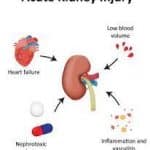Acute kidney injury (AKI) is a sudden loss of kidney function. It is a common and important side effect of cancer treatments. Because cancer patients have many other risk factors for AKI, such as infection, older age, and exposure to contrast dye for CT scans, preventing and properly managing AKI is extremely important.
AKI can interfere with your ability to get proper treatment, force your Doctor to delay or decrease doses of medications, and potentially worsen overall prognosis. Let us teach you how to help your medical team by appropriately reporting symptoms.
After having AKI, the chances are higher for other health ailments (kidney disease, stroke, heart disease) or AKI relapse. The possibilities for developing kidney ailments and kidney failure increase once AKI relapses. Preventing acute kidney injury is the best way to avoid kidney damage and save kidney function. Therefore, it is essential to treat AKI as early as possible though the mild form of acute kidney injury may not be noticeable.
How bad is my AKI?
AKI is graded based on your blood creatinine levels. This is a lab test done by your medical team. A one-time abnormal value does not mean that you have sudden or permanent kidney damage. But if your lab results continue to be abnormal, your Doctor may recommend specialized medical care to prevent chronic kidney disease.
Before we start, pull up your lab result and look at the “reference range” for serum creatinine. This range has a lower limit and an upper limit. We will use the upper limit of normal (ULN) to measure the severity of your AKI.
Mild: Creatinine is abnormal but less than 1.5 times the upper limit of normal (ULN). You should ask your medical team about this abnormal result, but mild AKI can generally be safely managed at home. See tips on managing mild AKI below.
Moderate: Creatinine is between 1.5 and 3 times the upper limit of normal. Most people with moderate AKI make a full recovery. Still, some people may develop chronic kidney disease or long-term kidney failure. The treatment needs a hospital stay. You may experience fatigue, diarrhea, dehydration, peeing less than usual, and drowsiness.
Keep track of your symptoms using Ankr (myAnkr web portal or the Ankr app). It will help you describe the uneasiness to your doctor or nurse.
Severe: Creatinine is more than 3 times the upper limit of normal. In severe cases, dialysis may be an option. It involves a machine that filters the blood to remove harmful waste, extra salt, and water from the body. It helps to replace kidney function until the kidneys recover. You may also experience confusion and other mental abnormalities. The main goal is to treat the cause of acute kidney injury. It is crucial to treat all the symptoms and complications.
Warning signs/severe symptoms of AKI that need immediate medical attention
- Decreased urine output or no urine output at all
- Swelling in the legs, ankles, or feet
- Fatigue or weakness
- Nausea or vomiting
- Loss of appetite
- Confusion or difficulty thinking clearly
- Seizures or coma
- Chest pain or shortness of breath
- High blood pressure
- Irregular heartbeat or palpitations
- Severe pain in the back or sides, especially if accompanied by fever, chills, or nausea
How to manage symptoms after AKI?
- Follow all the advice given by your caregiver or Doctor
- Stay hydrated by drinking plenty of fluids
- Follow a kidney-friendly diet as suggested by your Doctor
- Manage other chronic conditions, such as Diabetes and high blood pressure
- Attend follow-up appointments regularly
- Seek support from your loved ones and community
How to diagnose acute kidney injury?
To diagnose acute kidney injury, your healthcare provider may need to do some tests. These tests can include blood tests, urine tests, and imaging tests like an ultrasound or CT scan. In some cases, they may need to do a biopsy, which is when they take a small piece of kidney tissue to look at under a microscope. These tests can help your healthcare provider figure out what is causing your acute kidney injury and how severe it is. If you have symptoms of acute kidney injury, like less urine output, swelling, or tiredness, it’s important to see a Doctor right away.
What caused my Acute kidney injury

- Low blood volume due to excessive bleeding, vomiting, diarrhea (loose stools)
- Severe dehydration.
- Abnormalities of the blood vessels, such as inflammation and blockage in the blood vessels within the kidneys
- Anticancer Drug–Induced AKI (chemotherapy, immunotherapy, targeted agents)
- Enlarged prostate
- Bladder tumor
- Kidney stones
- Infections, such as sepsis
- Autoimmune disorders, such as lupus or vasculitis
- Blood clots in the kidneys
- Heart failure or other cardiovascular conditions
- Liver failure
- Pregnancy-related complications, such as preeclampsia
- Surgery or injury that affects blood flow to the kidneys
How to prevent AKI?
- Drink plenty of fluids to help maintain adequate blood flow to the kidneys and prevent dehydration.
- If you have diabetes or high blood pressure, contact your Doctor
- Take medications as prescribed
- Be cautious with over-the-counter medications, such as NSAIDs (e.g., ibuprofen, aspirin), and always read labels to avoid exceeding recommended dosages.
- Some supplements and herbal remedies can be harmful to the kidneys, so talk to your healthcare provider before taking them.
- Maintain a healthy lifestyle.
- Eat a healthy diet
- Exercise regularly
- Avoid smoking and excessive alcohol consumption.
- Seek prompt treatment for infections as infections can damage the kidneys.
How can Ankr help with your abnormal creatinine or AKI?
Don’t try to treat an AKI by yourself. Use Ankr to:
(1) learn about the common symptoms of AKI
(2) send message to your Doctor if they use Ankr platform*
(3) be better informed about how to prevent another AKI
